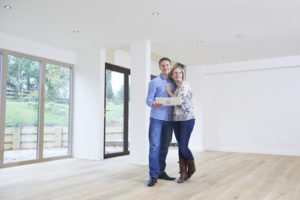By Allan Tran
Special to the Financial Independence Hub
Buying a home is usually the biggest investment you’ll make. Can you afford it?
Recent surveys show that potential buyers are concerned about interest rate increases and new federal lending guidelines. Many people are delaying their home purchases. It can be hard to know when to take the plunge or hit pause. Try these exercises:
Simulate the total expense
When talking to mortgage brokers and real estate agents, you can get preoccupied with rates, what you can get approved for, and listing prices. Those matter, but figure out the bottom line. Can you swing the total costs and still live your life?
Calculate your expected fixed home ownership costs: mortgage payment, property tax, home insurance, utilities, etc. Take that total and compare it to what you’re paying now for rent. The difference is what you’ll need to be able to cover.
Now, set that amount aside every month for a year. That’s long enough to experience all the ups and downs of your annual expenses. See whether you can handlethe monthly savings for the home you want for a sustained period
Take a hard look at your spending
Saving for a home, then managing the ongoing expense, can require a shift in spending habits. You can’t do that without a handle on where you actually spend your money.
Review the last three months of your credit-card statements and other bills. Look at wants versus needs. Think about what costs you could have avoided and how those add up. For instance, many costs that we tap a card for are variable. You can likely avoid some. Try and park that money into savings.
Another strategy is to force savings by tying it into spending. Say you spend $20 a week on coffee. Yes, you can save $1,000 a year by foregoing that. But you want coffee. Well, you also want a home. How about putting the equivalent towards it? It’s just a way of disciplining yourself to save for a bigger dream.
Force accountability
If you’re buying a home with a partner or spouse, get a joint account where you can’t pull out money without both signing off. This will help you think twice about spending and hold each other accountable.
Many couples have different spending and savings habits. The point is to train you to have honest conversations about finances. If you’re going to own a home together, you need to be on the same financial page before, during and after the purchase.
Stress test yourself
The Office of the Superintendent of Financial Institutions has new rules around mortgage underwriting. Potential home buyers must be able to handle a minimum qualifying rate: the greater of the five-year Bank of Canada benchmark rate, or the contracted mortgage rate plus two percentage points.
If you need to borrow $200,000 at a 3.5% interest rate, the bank must be convinced you can carry the load if the rate rises to 5.5%. The regulations cover the big banks. While credit unions are regulated differently many have their own stress tests, including Meridian.
Apply your own. For every $100,000 you borrow, could you cope with an extra $100 a month in mortgage payments? Give yourself that contingency. Interest rates aside, your personal and professional circumstances, and your financial obligations, often change.
See a financial advisor
Your advisor knows how to help you reach your goals. So you can put your money into the right products and employ the best savings strategies.
You also don’t want to be house rich and cash poor. You need to have enough to pay your other bills, handle the unexpected, go away occasionally and save for retirement.
Don’t view your home purchase in isolation. Ultimately, buying a home is part of overall financial planning.
 Allan Tran is a Business Development Manager at Meridian Credit union in Hamilton, Ont. He has been in the finance industry for the past 11 years. Over those years, Allan brings knowledge in all aspects of finance from personal banking, personal borrowing, small business banking, and wealth. In the Business Development role, Allan finds opportunity to not only help individuals save money, but review their short term and long term goals and make them a reality. Over the course of the 11 years, Allan has been a teller, advisor, Manager of Customer Service, Manager of Financial Services, Community Leader and Branch Manager. With understanding the retail structure, Allan is able to align clients to the appropriate lines of business to assure all financial needs are met.
Allan Tran is a Business Development Manager at Meridian Credit union in Hamilton, Ont. He has been in the finance industry for the past 11 years. Over those years, Allan brings knowledge in all aspects of finance from personal banking, personal borrowing, small business banking, and wealth. In the Business Development role, Allan finds opportunity to not only help individuals save money, but review their short term and long term goals and make them a reality. Over the course of the 11 years, Allan has been a teller, advisor, Manager of Customer Service, Manager of Financial Services, Community Leader and Branch Manager. With understanding the retail structure, Allan is able to align clients to the appropriate lines of business to assure all financial needs are met.




Great article, Allan! So good for people to think ahead about the true cost of owning a home. A couple of points to add – potential buyers should add in the cost of home repairs/maintenance (estimated at between 1% and 5% annually of the cost of the home depending on age of the dwelling) and renovations. Renos can easily cost $10,000 to $50,000 per year, depending on the new owners’ desires. These figures are not necessarily what someone will spend each year, but rather averaged out over five or 10 years (condos have special assessments, furnaces, driveways, roofs, etc. all need replacing).
If you want to go own step further, add in the lost opportunity cost of the down payment.
@Steve Bridge, That is awesome advice and you are definitely right. The cost of renovating a home can be costly and more so if you are purchasing an existing home and not a new build home. This is where a great real estate agent would come into play to help not only find the perfect home, but to also walk a new buyer through the process of when things should be changed (furnace, air conditioner, drive way) and what it would roughly cost. This way, buyers can properly plan without having to borrow on high interest rate credit cards. For those reading, an example: If a reno costs $15,000 and you were to place it on a credit card @ 19.99% annually, and you only paid the minimum amount owing, the annual interest would be almost $3,000.00. So for every year that the credit card is not paid off, you just added $3,000 a year to the project amount. So in 1 year a $15,000 project just became a $18,000 project. Planning ahead will save you from these costs down the road.